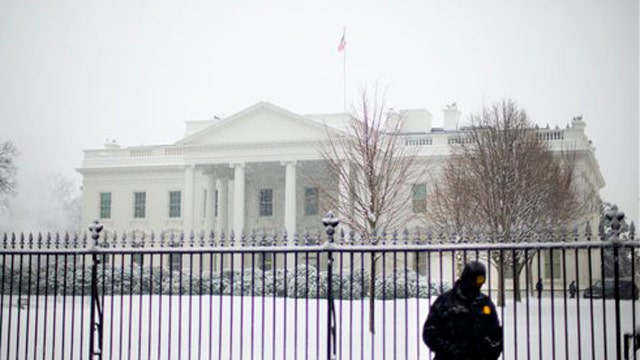More than 100 accidents. Traffic snarled for miles. A de facto shutdown of the capital of the free world.
What could cause such a crippling catastrophe? A dusting of snow.
This was the reality Wednesday night in the Washington, D.C., area where a seemingly routine weather event brought the evening commute to a messy, gridlocked halt -- two days before the real storm was scheduled to hit.
It's the kind of scene that leaves the rest of America scratching their heads. But D.C.'s traffic nightmare was hardly a one-off. The lack of basic preparedness – even with ample warning of a storm approaching – is, at times, somewhat of a given in and around the nation’s capital.
The government’s two-step response to seasonal weather largely has been to close up shop and wait for things to get better. And when wintry weather strikes at the end of a workday, Washington's roads quickly become a live-action metaphor for government itself.
By Thursday, local officials once again were apologizing for a slipshod (emphasis on the slip) response. Hearing it from their constituents, they said they simply were caught off guard and vowed, this time, to do better.
D.C. Mayor Muriel Bowser tweeted an apology Thursday, acknowledging crews should have been sent out to salt the streets earlier.
In Northern Virginia, Arlington County officials didn’t admit wrongdoing but conceded they were “caught by surprise” and had “underestimated the amount of yesterday’s snow, and the ice that came with it.”
“Our crews began pre-treating some streets with brine, in anticipation of tomorrow’s expected blizzard,” a press release said. “They did not get to all of them before the snow began to fall, and it is not clear that the brine helped, due to the very cold roadways, heavy traffic and heavier-than-expected snow.”
For the record, it was an inch of snow.
Virginia State Transportation officials said they didn’t pre-treat the roads because temperatures were so low they were afraid the treatment might freeze, creating even more treacherous conditions.
“It only takes a little bit of ice to create a very serious situation,” Virginia Department of Transportation spokeswoman Jennifer McCord said.
The icy conditions developed anyway.
In Northern Virginia, just outside city limits, traffic was snarled for miles long after rush hour.
A slick, albeit slim, coating of snow and ice on the roads – in some places seemingly untouched by plows -- rendered commuters helpless and stuck on mild inclines.
At one clogged commuter artery south of Alexandria, vehicles at the front of a long line of traffic were seen going down a gentle slope two or three at a time, sliding to and fro with locked wheels in a forlorn battlefield of hazard lights that conceded: the weather was winning.
A steady stream of frustrated travelers called WTOP’s weather hotline, complaining about the conditions throughout the region.
“I am on Indian Head Highway. It has not been treated. This is unbelievable. This is pathetic. This is not managed government,” one caller said.
Following Wednesday’s performance, Maryland, D.C. and Virginia have all declared states of emergency ahead of Friday’s massive storm predicted to dump as much as two feet of snow and ice on the area.
D.C. announced all public schools would be closed Friday and local government offices would close early. Metro is planning to shut down Friday night and remain closed through the weekend.
President Obama got an up-close dose of the capital’s inaction when his motorcade slipped on snow-covered roads Wednesday evening. A 25-minute trip from Joint Base Andrews in Maryland to the White House stretched to more than an hour, giving the president a long, slow look at the cars littered and abandoned in the street.
The region’s response never ceases to amaze the many officials who represent much snowier parts of the country.
Last year, following yet another government snow day on Capitol Hill, Rep. Jason Chaffetz, R-Utah, remarked: “Wimps. … Imagine if the rest of the country closed when it snowed.”
FoxNews.com's Barnini Chakraborty and Judson Berger contributed to this report.













































